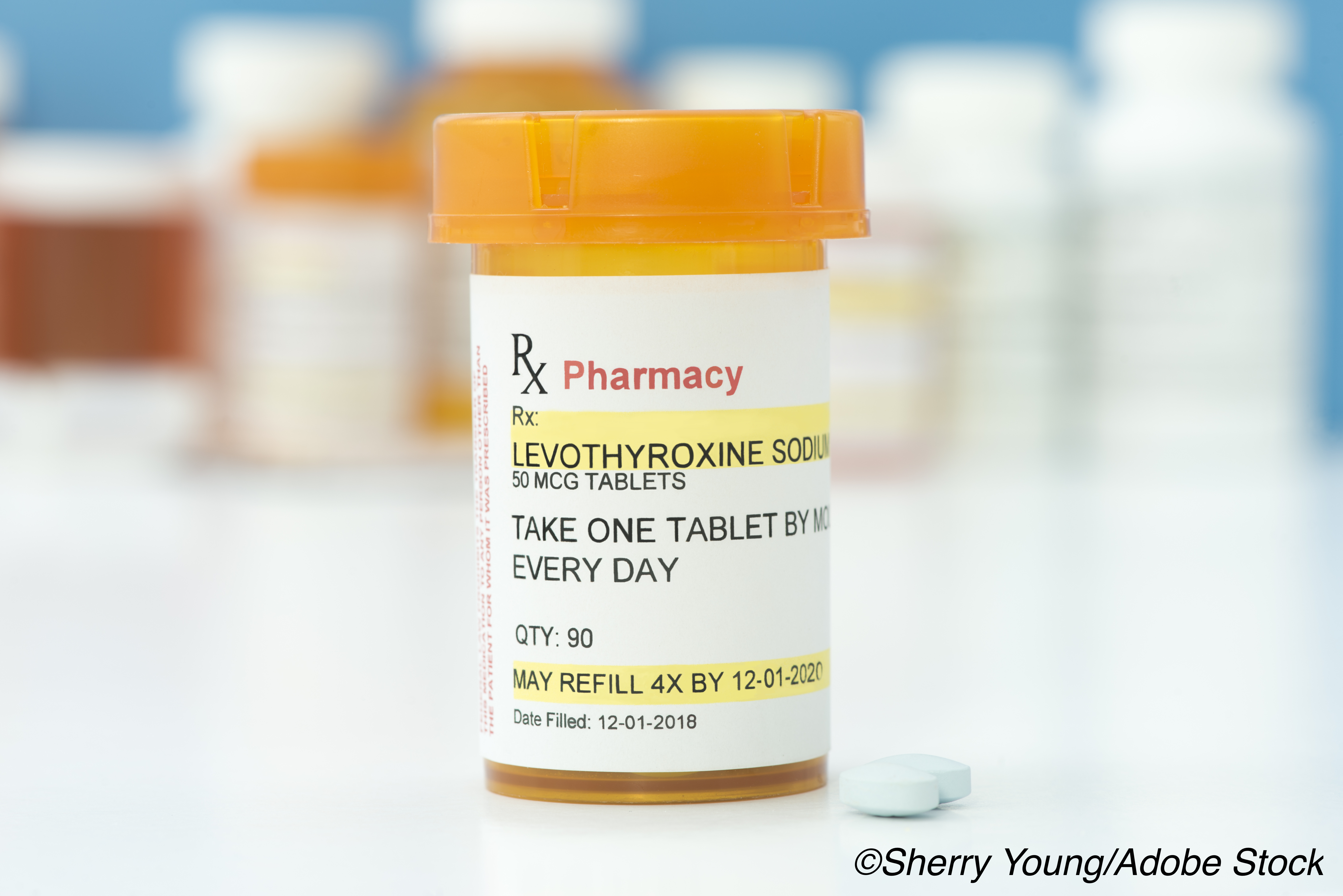Since thyroid hormones are known to play a role in ventricular function — and because even subclinical hypothyroidism is linked to worse outcomes in patients with acute myocardial infarction (AMI) — could that prognosis be improved with addition of levothyroxine?
Unfortunately, the answer is no, according to Salman Razvi, MD, of the Translational and Clinical Research Institute, Newcastle University, Newcastle-upon-Tyne, England, and colleagues who reported results of a small double-blind, randomized trial in JAMA.
They tested daily levothyroxine treatment for 52 weeks in both patients with ST-segment elevation MI (STEMI) and non-ST-segment elevation MI — and, in both cohorts, they found no significant improvement in LVEF compared to placebo.
“In both groups, LVEF improved in the 52 weeks following acute myocardial infarction: from a mean (SD) of 51.3% (9.1%) to 53.8% (9.7%) in the levothyroxine group and from 54.0% (7.9%) to 56.1% (7.9%) in the placebo group. Levothyroxine did not significantly alter LVEF at 52 weeks, with an adjusted between group mean difference of 0.76% (95% CI, −0.93% to 2.46%; P= .37),” they wrote.
Secondary outcomes at 52 weeks included:
- Levothyroxine LV end-diastolic volume per body surface 66.7 mL/m2 versus 70.4 mL/m2.
- End-systolic volume per body surface area 31.1mL/m2 (levothyroxine) versus 31.4 mL/m2.
- Cardiac output (levothyroxine) 4.1 L/min versus 4.6 L/min.
- Infarct size (levothyroxine) 5.8% versus 8.4%).
- LV mass between group difference levothyroxine versus placebo 0.02% [95% CI, −1.34% to 1.38%] and 1.97 g [95% CI, −4.43 to 8.37], respectively).
“Serum thyrotropin levels declined over the 52 weeks of study in both groups,” they wrote. “However, the median thyrotropin level was lower in the levothyroxine group (1.8 mU/L [IQR, 1.3- 2.2]) compared with the placebo group (3.2 mU/L [IQR, 2.7-4.2]) after 52 weeks. Furthermore, the median thyrotropin level was consistently lower in the levothyroxine group at all study time points compared with the corresponding values in the placebo group. Conversely, FT4 levels were higher in the levothyroxine group at the end of the study: mean (SD) levels of 1.34 (0.21) ng/dL versus 1.13 (0.16) ng/dL in the placebo group at 52 weeks. The median daily dose of levothyroxine at the end of the study was 50 μg (IQR, 50-75). Adherence to study medication was good over the course of the study (94%).”
Levothyroxine was not associated with any increase in adverse cardiac events.
The authors noted that AMI in patients with subclinical hypothyroidism is associated with a 3.6 fold increase in risk of cardiac mortality and a 2.3 fold increase in risk of all-cause mortality. That fact, combined with the fact that older persons with subclinical hypothyroidism have a 72% reduced risk of heart failure events if treated with levothyroxine, make the trial findings not only unexpected, but also puzzling.
One possible explanation is that the trial design of previous observational studies linking subclinical hypothyroidism to poor prognosis relied on a single blood test to identify hypothyroidism. “Up to half of raised serum thyrotropin levels in individuals with subclinical hypothyroidism and acute myocardial infarction normalize over time,” they wrote. “Furthermore, thyrotropin levels are known to rise during the recovery phase of nonthyroidal illness or could be affected by the iodine content in the angiographic contrast media. In this trial, only patients with sustained subclinical hypothyroidism were included and had their baseline thyroid function assessed prior to coronary angiography.”
There were a number of limitations, including the delay between AMI and initiation of levothyroxine — a median of 17 days — which may have “blunted” the therapeutic efficacy. Additionally, due to safety concerns, levothyroxine was initiated at a very low dose and titrated over several weeks, and dosing was therefore lower than the doses that demonstrated efficacy in other trials. Additionally, it is possible that individuals with “chronic persistent subclinical hypothyroidism may be a different population” than those studied in the trial, they added.
Finally, the authors concluded that the “findings do not support treatment of subclinical hypothyroidism in patients with acute myocardial infarction.”
-
Note that in patients with subclinical hypothyroidism and AMI year-long treatment with levothyroxine did not significantly improve LVEF compared with placebo.
-
Be aware that the findings from this placebo-controlled trial do not support treatment of subclinical hypothyroidism in AMI patients.
Peggy Peck, Editor-in-Chief, BreakingMED™
Razvi reported receiving grants from the National Institute for Health Research (NIHR) and nonfinancial support from Amdipharm Pharmaceuticals UK Ltd during the conduct of the study and personal fees from Merck Plc and Abbott Pharmaceuticals Pvt Ltd outside the submitted work.
Cat ID: 358
Topic ID: 74,358,730,358,110,192,925



